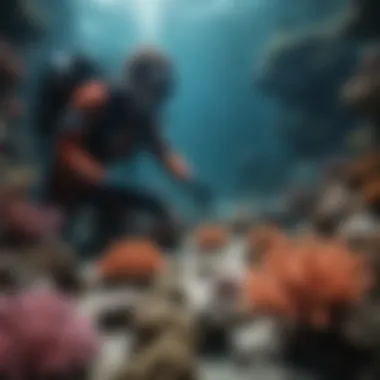Exploring Oceanic Research Jobs: A Comprehensive Guide


Intro
The field of oceanic research encompasses a wide range of jobs devoted to studying our planet's vast oceans. Professionals in this domain contribute vital knowledge about marine ecosystems, the impact of climate change, and the sustainability of marine resources. Engaging in this area requires a blend of scientific expertise, analytical skills, and a passion for the environment.
Those who pursue careers in oceanic research typically find themselves working at the intersection of various disciplines such as biology, chemistry, and environmental science. The roles can vary significantly, ranging from field researchers conducting hands-on studies to data analysts interpreting vast sets of information. This article presents a comprehensive guide to navigating the multifaceted world of oceanic research jobs, discussing the various career paths available, the qualifications needed, and the institutions playing key roles in marine scientific studies.
Understanding the significance of ocean research goes beyond merely cataloging species or monitoring water quality; it is crucial for making informed decisions about conservation and resource management. As such, this guide serves not only as a resource for students and academics but also for professionals looking to deepen their understanding of ocean science and the available career opportunities.
Prelude to Oceanic Research
Oceanic research is a critical field that investigates the vast and intricate dynamics of Earth's oceans. As the planet's largest ecosystem, oceans play a pivotal role in climate regulation, biodiversity, and human livelihood. In this article, we explore various facets of oceanic research careers, including job types, necessary qualifications, and key institutions. Understanding oceanic research is vital in addressing contemporary environmental challenges. As climate change and pollution threaten marine life and global systems, professionals in this field are instrumental in proposing data-driven solutions.
Defining Oceanic Research
Oceanic research encompasses various scientific disciplines aimed at understanding oceanic processes, ecosystems, and the interactions between marine organisms and their environments. This domain includes oceanography, marine biology, environmental science, and climatology. Researchers employ diverse methodologies, such as field studies, remote sensing, and laboratory experiments, to gather and analyze data. Each approach contributes to a holistic comprehension of the oceans. Detailed knowledge in oceanic research is essential for informed decision-making and policy development concerning marine conservation and resource management.
Importance of Oceanic Studies
The significance of oceanic studies cannot be overstated. Oceans cover more than 70% of the Earth's surface and are crucial for many biological and geophysical processes. Here are several prominent reasons why this field is important:
- Impact on Climate: Oceans regulate global climate by absorbing carbon dioxide and heat. Understanding these processes is vital for climate change mitigation.
- Biodiversity Conservation: Oceanic research helps identify and protect endangered species and fragile ecosystems, which are essential for ecological balance.
- Human Health and Food Security: Research informs sustainable practices for fisheries and aquaculture, which are vital for food supply and economic stability.
- Natural Resource Management: Knowledge of oceanic ecosystems aids in the responsible management of natural resources, ensuring long-term sustainability.
Research in this domain also enhances public awareness and education regarding ocean-related issues, fostering a climate of stewardship towards marine environments. As we progress further into the 21st century, the roles played by oceanic researchers will only gain more prominence.
Types of Oceanic Research Jobs
Oceanic research unfolds in many dimensions, contributing significantly to our understanding of marine environments and their complexities. Exploring the different types of job roles available in this field provides insights into the diverse career paths and necessary expertise required. Each position holds distinct responsibilities, skills, and opportunities for professional growth.
Field Researchers
Field researchers play a crucial role in collecting data directly from marine environments. They often work in challenging conditions, such as on boats or remote coastal areas, as they gather samples and observe marine life. The work requires physical stamina and adaptability. Their findings form the basis of many studies, contributing to sustainable practices and conservation efforts.
Field researchers must be prepared to face various natural elements. They often need experience in diving or sailing, depending on the environments studied. This job can lead to significant contributions in marine biology, ecology, and environmental science. This role provides firsthand experience of the intricate relationships within ocean ecosystems.
Laboratory Scientists
Laboratory scientists complement the efforts of field researchers. They analyze samples collected from various marine environments. Their work involves quantitative analysis and experimentation to understand organisms at the cellular or molecular level. This role often requires a strong background in biology or chemistry. An understanding of complex analytical techniques is essential.
Laboratory environments offer a different pace compared to field work. Scientists focus on experiments that can take weeks or months to yield results. These findings are crucial for developing medications, understanding pollutants, and advancing marine biotechnology. Laboratory scientists offer the analytical power needed to interpret the extensive data gathered by field researchers.
Data Analysts
As data becomes increasingly integral to research, data analysts in oceanic research have become essential. They specialize in handling large datasets derived from various sources, including satellites, fieldwork, and lab results. Their skills in statistics and data visualization enable them to derive meaningful insights that inform policy and environmental management.
Data analysts work closely with both field researchers and laboratory scientists. Their role is technical but highly impactful. Effective data analysis often leads to innovative solutions for conservation challenges. The demand for skilled data analysts is growing as the field incorporates more technology-based solutions to understand complex ocean systems.
Policy Advisors
Policy advisors bridge the gap between scientific evidence and practical application in marine conservation. They synthesize research findings to inform policymakers and stakeholders about the importance of sustainable practices related to ocean resources. Their work requires a deep understanding of both science and social dynamics.
Policy advisors often come from diverse educational backgrounds. A grasp of environmental law, economics, and social sciences enhances their effectiveness in advocating for evidence-based decisions. Their influence can lead to new regulations and initiatives that aim to protect marine ecosystems and ensure sustainable practices in fishing, tourism, and resource management.
In summary, the variety of jobs within oceanic research showcases the importance of interdisciplinary collaboration. Each role, from field researchers to policy advisors, contributes uniquely to the understanding and preservation of our oceans.
Educational Requirements for Oceanic Positions
Understanding the educational requirements for oceanic positions is pivotal in establishing a successful career in marine sciences. The realm of oceanic research demands professionals who not only possess theoretical knowledge but also practical skills essential for navigating the complexities of marine ecosystems. As students and aspiring researchers consider roles in this field, awareness of requisite educational paths becomes a fundamental step in shaping their careers. This section will explore undergraduate degrees, graduate studies, and essential skills that together create a robust framework for success in oceanic research.


Undergraduate Degrees
An undergraduate degree serves as the initial step for many aspiring oceanographers, marine biologists, and environmental scientists. Programs such as a Bachelor of Science in Marine Biology or Environmental Science provide foundational knowledge critical to understanding ocean ecosystems. These degree programs typically cover core subjects like biology, chemistry, physics, and environmental studies. In addition, many programs offer hands-on field experiences that immerse students in real-world oceanic research.
A degree in marine studies also opens doors to interdisciplinary learning. Courses in geography, oceanography, and policy studies become increasingly relevant, helping students to develop a well-rounded perspective on oceanic challenges.
Advantages of obtaining an undergraduate degree include:
- Access to entry-level positions in marine research and conservation.
- Opportunities for internships that provide valuable practical experiences.
- Ability to identify specific areas of interest for advanced studies.
Graduate Studies
Graduate studies elevate the expertise of professionals in oceanic research. A Master's degree or Ph.D. in marine science, oceanography, or related fields is often necessary for advanced positions, especially in research and academia. Graduate programs delve deeper into specialized topics such as marine ecology, climate science, and oceanic policy. This level of education enables researchers to develop new theories, publish significant findings, and contribute to knowledge that informs environmental management and policy decisions.
Enrolling in a graduate program also enhances a candidate's network within the academic and research communities, opening pathways for collaborative projects. Those with advanced degrees may also pursue teaching roles, influencing the next generation of oceanographers.
Consider the following during graduate studies:
- Choose institutions with strong marine programs to ensure quality education.
- Seek research opportunities that align with career aspirations.
- Engage with mentors who can provide guidance and support throughout your studies.
Essential Skills
While formal education lays the groundwork, essential skills complement academic training and are crucial in oceanic research. Critical thinking, analytical skills, and attention to detail are vital for interpreting data and conducting experiments. Moreover, proficiency in statistical analysis and data management software is increasingly important, as oceanic research often involves extensive datasets.
Fieldwork skills are equally important. Effective communication, teamwork, and adaptability are necessary attributes when working in diverse environments and with interdisciplinary teams.
To summarize, pursuing educational requirements in oceanic positions involves:
- Undergraduate Degrees: Building foundational knowledge and practical experience.
- Graduate Studies: Fostering advanced understanding and expanding professional networks.
- Essential Skills: Enhancing the ability to conduct research and collaborate effectively.
Education in oceanic research is not just about acquiring knowledge but also about applying it in real-world situations to address critical environmental issues.
Key Institutions in Oceanic Research
Key institutions play a vital role in oceanic research. They provide the infrastructure, funding, and expertise necessary to explore the vast complexities of marine ecosystems. Understanding these institutions can help potential career-seekers identify where they can apply their skills and knowledge. Diverse entities such as research institutes, universities, and government agencies all contribute uniquely to this field.
Research Institutes
Research institutes are pivotal in conducting advanced studies and facilitating scientific advancements. They often focus on specific areas like marine biology, oceanography, and environmental science. Examples include the Scripps Institution of Oceanography and the Woods Hole Oceanographic Institution. These organizations not only conduct research but also develop new technologies and methodologies for studying oceanic phenomena.
Moreover, they often collaborate with universities and governments to enhance data collection and foster innovations. Working at a research institute can provide hands-on experience with cutting-edge research while contributing to significant studies that inform policy and conservation efforts.
Universities with Strong Marine Programs
Universities with robust marine programs are essential in nurturing future oceanic researchers. They offer specialized degrees and interdisciplinary courses that integrate marine science with environmental studies, biology, and technology. Institutions like the University of California, Santa Barbara, and the University of Miami are known for their comprehensive marine programs.
These universities conduct significant research and often partner with local and international organizations to address ocean-related issues. Students benefit from a curriculum that combines theoretical knowledge with practical experience. Through internships and field studies, they gain valuable insights into the workings of oceanic research.
Government and Non-Governmental Organizations
Government and non-governmental organizations serve as key players in ocean policy making and conservation efforts. Agencies like the National Oceanic and Atmospheric Administration (NOAA) and the Environmental Protection Agency (EPA) work on monitoring ocean health and implementing protective measures. They are essential in driving legislation and funding for marine research.
Non-governmental organizations, such as Oceana and the Ocean Conservancy, advocate for sustainable practices and public awareness on ocean issues. They often employ researchers and policy advisors who contribute expertise to their efforts.
These organizations provide opportunities for professionals to engage in meaningful work that impacts both policy and conservation. Working in such environments allows researchers to apply their findings in ways that promote healthier oceans and informed public policy.
Institutions of oceanic research collaborate globally to enhance understanding and drive solutions for marine issues.
Career Prospects in Oceanic Research


The topic of career prospects in oceanic research is essential for anyone interested in pursuing a career in this vital field. Understanding the opportunities available is crucial for students, researchers, and professionals alike. As global environmental issues escalate, the demand for experts in marine science continues to grow. Job prospects in this sector are not only promising but also significant for the advancement of knowledge and preservation of marine ecosystems. With advancements in technology and increasing collaboration across various disciplines, individuals entering the oceanic research field can find various rewarding career pathways.
Current Job Market Trends
The job market for oceanic research is currently dynamic, reflecting broader trends in environmental awareness and technological integration. According to recent studies, marine scientists, data analysts, and policy advisors are among the roles seeing increased demand. This growth is influenced by several factors:
- The rise of climate change concerns has prompted a stronger need for research.
- Industry and governments are increasingly investing in sustainable practices.
- There is a notable increase in funding from both governmental and non-governmental organizations for marine projects.
In addition, interdisciplinary approaches are becoming more prevalent. As marine science intersects with fields like data science and engineering, the value of diverse skill sets becomes apparent. Positions in data analytics, for instance, are critical as organizations seek to make sense of vast amounts of ecological data. This evolution indicates that professionals equipped with both biological and computational skills are likely to stand out.
Emerging Opportunities
With ongoing advancements and shifts in the field, several emerging opportunities are noticeable:
- Ocean Technology Development: The growth of autonomous underwater vehicles and remote sensing technologies is creating new jobs focused on hardware and software development.
- Climate Research: Positions addressing the impact of climate change on marine ecosystems are expanding. Here, the focus is often on data collection and analysis to inform policy decisions.
- Conservation Roles: As the importance of ocean conservation becomes more recognized, career paths in project management for ocean conservation programs are developing.
More organizations are emphasizing sustainability and conservation, influencing hiring trends. Moreover, collaboration among universities, private sectors, and environmental organizations fosters innovative research initiatives. Networking within these realms can lead to new job openings as collaborative projects gain traction.
The future in oceanic research careers is promising and offers diverse opportunities for aspiring professionals. Whether through technology or dedicated research, the potential for impact is substantial. In summary, understanding current trends and emerging possibilities is crucial for anyone looking to excel in this vital area of study.
Challenges in Oceanic Research Employment
The field of oceanic research is not without its complexities. Professionals and aspiring researchers face various challenges that can impact their career paths. Understanding these challenges allows individuals to strategize effectively and navigate their careers more successfully. This section discusses the critical challenges, specifically focusing on funding issues and global competition.
Funding Issues
Funding is a central concern in oceanic research employment. Research projects often require substantial financial resources for equipment, personnel, and field studies. When funding is insufficient, projects risk being delayed or canceled altogether. This situation can lead to job insecurity for scientists and researchers.
Government grants and private funding often dictate the availability of opportunities. However, competition for these funds is fierce. Researchers must continuously demonstrate the potential impact and significance of their work to secure financial backing. The shifting political climate can also influence funding viability, affecting long-term research projects.
Some common sources of funding include:
- National Oceanic and Atmospheric Administration (NOAA)
- National Science Foundation (NSF)
- Various non-profit organizations
Given the competitive environment, it is crucial for researchers to hone their grant-writing skills. Effective communication of their research's importance can make the difference in obtaining financial support.
Global Competition
Another significant challenge is the intense global competition within oceanic research. As environmental issues become more pressing, more individuals and institutions enter the field. This influx creates a dense job market where standing out becomes increasingly challenging.
Institutions worldwide, from universities to research laboratories, seek top talent. Consequently, candidates must cultivate diverse skill sets and experience to attract attention. Collaboration and networking play essential roles in overcoming these challenges. Building professional connections can lead to job referrals and collaborative opportunities, which can enhance career prospects.
Key considerations for dealing with global competition include:
- Continuously upgrading skills to meet industry standards
- Engaging in interdisciplinary projects for broader exposure
- Actively participating in conferences and workshops to build networks
"The ability to collaborate and network effectively can greatly enhance one's chances in a competitive field like oceanic research."
The Role of Technology in Oceanic Research
Technology plays a crucial role in modern oceanic research. As the complexity of marine environments increases, the tools for studying these ecosystems must also advance. New methods and instruments enable researchers to collect data more efficiently and accurately. Utilizing technology allows scientists to understand marine life and oceanic processes better. The integration of various technological advancements has broadened the scope of ocean research, leading to more informed decisions and strategies in marine conservation and policy formulation.
Advancements in Research Tools
Research tools have evolved enormously in the last decades. Devices like autonomous underwater vehicles (AUVs) and remotely operated vehicles (ROVs) are increasingly used to explore deep-sea environments. These tools allow scientists to access areas that were once considered unreachable.
Moreover, sensor technology has advanced significantly. Sensors can now measure a variety of parameters, such as temperature, salinity, and pressure at high resolution and in real-time. Some specific advancements include:
- Satellite Imagery: Offers large-scale data on ocean currents and temperature changes.
- Sonar Technology: Used for mapping seabeds and studying marine species' behavior.
- Molecular Techniques: Enable the identification of species in water samples.


Such tools enhance our capability to monitor changes in ecosystems and respond to environmental challenges more effectively.
Impact of Data Science
Data science has impacted oceanic research in profound ways. With the vast amounts of data generated from research and monitoring, analytical methods play a pivotal role in deriving meaningful insights. Through sophisticated algorithms and machine learning, researchers can identify patterns and correlations in ocean data that were previously undetectable.
Several key aspects highlight the importance of data science in this field:
- Predictive Modeling: Helps forecast changes in marine ecosystems due to climate change or human impact.
- Ecological Assessments: Analyzing data allows for more accurate evaluations of species populations and distributions.
- Policy Development: Evidence-based knowledge informs better regulation and management strategies.
Collaboration and Networking in the Field
Collaboration and networking play a crucial role in oceanic research. These elements enhance the possibilities for innovation and discovery in a field that is inherently interdisciplinary. In oceanic research, scientists do not operate in isolation; instead, they benefit from the shared knowledge and resources of a wider community. This section delves into the importance of building professional connections and engaging in interdisciplinary collaboration.
Building Professional Connections
Establishing professional connections in oceanic research can significantly impact a career. Networking allows researchers to share insights, resources, and opportunities. It's important for marine scientists to connect with peers in their specific area of study and also with those in adjacent fields. Building these relationships can lead to potential job opportunities, collaborations on projects, and access to funding sources.
To build these connections effectively, researchers should consider the following strategies:
- Attend conferences: Engaging in conferences related to marine sciences allows researchers to meet others in the field. These gatherings provide a platform for presenting research and discussing trends.
- Join professional associations: Many associations offer networking events, workshops, and resources for their members, opening doors for collaboration.
- Utilize social media: Platforms such as LinkedIn can be valuable for connecting with professionals who share similar interests.
In essence, strong professional networks can lead to a better understanding of the field and help in overcoming barriers that may exist.
Interdisciplinary Collaboration
Interdisciplinary collaboration is essential in addressing complex oceanic challenges. Many issues, such as climate change and marine pollution, require expertise from multiple disciplines. By collaborating with scientists, engineers, policy makers, and community stakeholders, researchers can create comprehensive strategies that improve outcomes.
Benefits of interdisciplinary collaboration include:
- Broader perspectives: Engaging with different fields promotes diverse approaches to problem solving.
- Enhanced research quality: Collaborative efforts can lead to more rigorous and validated research outputs.
- Increased funding opportunities: Many funding bodies favor projects that involve multiple disciplines, viewing them as more likely to yield significant outcomes for society.
Successful interdisciplinary projects often involve regular communication and a shared vision. Establishing a clear understanding of each participant's role can facilitate smoother collaborations.
"In marine research, working together breaks down silos, leading to innovative solutions that a single discipline could struggle to achieve."
Future Directions in Oceanic Research Careers
The landscape of oceanic research careers is continually evolving. Future directions in this field encompass various innovations and trends that hold significant potential for marine sciences. The importance of these directions cannot be overstated, as they not only shape career opportunities but also influence the broader understanding of ocean health and its ecosystems.
New technologies and methodologies are transforming how researchers approach their work. This evolution leads to greater precision in data collection and analysis, enhancing the overall quality of research. Careers in oceanic research will likely require adaptability to these changes. Professionals must stay abreast of advancements to remain competitive and effective in their roles.
Furthermore, the ongoing significance of ocean conservation efforts cannot be ignored. Emerging research prominently focuses on sustainability, impacting how career pathways are designed. As the industry shifts towards promoting environmental responsibility, professionals must align their work with sustainability goals.
Innovations and Trends
Innovations in oceanic research careers often emerge from technological advancements. For instance, the use of autonomous vehicles and drones is revolutionizing marine data collection. Such tools allow for large-scale surveys that were previously resource-intensive and time-consuming. In addition, data analysis is being transformed through machine learning and artificial intelligence, offering new avenues for interpreting complex marine data.
A few notable innovations include:
- Remote Sensing: Technologies processing satellite data to monitor ocean changes.
- Genomic Technologies: Used for species monitoring and understanding biodiversity.
- Ocean Data Platforms: Centralizing research data for collaboration across the sector.
By utilizing these innovations, marine researchers can gain deeper insights into oceanic processes and environmental changes. Consequently, these advancements help in developing more effective strategies for conservation and resource management.
Sustainability and Ocean Conservation
Sustainability is increasingly becoming a focal point within oceanic research. As the effects of climate change become more pronounced, professionals in this field are called to address pressing environmental issues. The future of oceanic research careers will include a strong emphasis on sustainability practices that protect marine ecosystems.
In this context, ocean conservation efforts will require interdisciplinary approaches. Collaboration with various sectors, such as policy-making and community engagement, is essential. This will foster a holistic understanding of how human activity impacts ocean health.
Key considerations include:
- Integrated Coastal Management: Collaborations across disciplines to ensure sustainable use of coastal resources.
- Community-Driven Conservation Efforts: Engaging local communities in marine conservation initiatives.
- Policy Development: Advocating for regulations that promote sustainability and protect marine environments.
The future of oceanic research promises rewarding career paths for individuals committed to sustainability and conservation principles. As such, these directions not only hold considerable relevance for career prospects but also contribute significantly to the imperative task of safeguarding our oceans.















